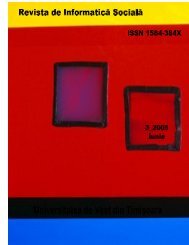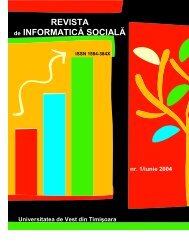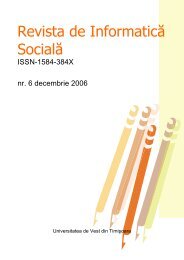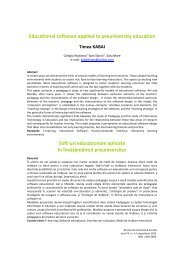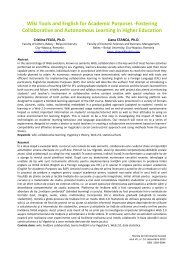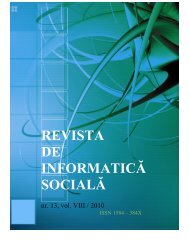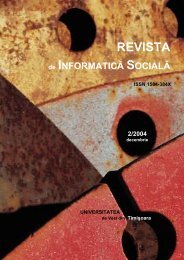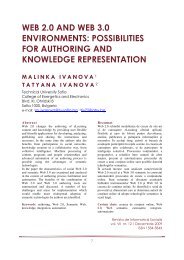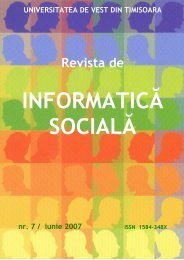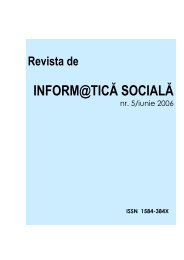If until now have only mentioned the WIP as an innovation for the research in the web, it seemsnecessary to highlight its importance as a strategy for promoting the educational process. As wellsaid Bla<strong>de</strong>s (2000, p.33), "every innovation shapes our way <strong>of</strong> thinking."One <strong>of</strong> the hallmarks <strong>of</strong> the 20 th Century and early 21 st Century are the inventions thatrevolutionize, every day, important sectors <strong>of</strong> our life, in particular, manufacturing sector andcommunications. Those inventions revolutionize also the social life and it ends up havingimplications for how we think and organize the school and the educational process. The use <strong>of</strong>computers and internet in schools should be expan<strong>de</strong>d, but not targeting only the mechanicaldomain <strong>of</strong> resources that the machine <strong>of</strong>fers. The stu<strong>de</strong>nts are being challenged to master the"machine" and appropriating it to the most diverse uses. This should not be inhibited by the school,driven by a fear that a wrong exploration <strong>of</strong> the Internet put the stu<strong>de</strong>nts in some form <strong>of</strong> risk. It isup to educators to discover the potential for creativity and autonomy in using the computer to makeit an indispensable tool in the process <strong>of</strong> educating citizens for today´s life. We argue, as Rada(2004) and Kennway (1998), that education that incorporates DICT and the education forcitizenship are not separated.ConclusionTo the extent that Internet access in schools increases - which also occurs, in countries like Brazil,significantly in the public education - the possibility for teachers to adopt learning strategies thatuse the gathering <strong>of</strong> online information should be consi<strong>de</strong>red. After all, with a significant increase –at a fast speed – <strong>of</strong> the sources <strong>of</strong> information, is no longer justified that stu<strong>de</strong>nts stay restricted onlyto the information that tell their teachers or are reported on their textbooks. It will be nee<strong>de</strong>d asignificant change. From book reading for screen reading there is a path with implications greaterthan the simple exchange <strong>of</strong> media, from the printed to the imagery. The printed text is static,representing a knowledge organization ready, <strong>of</strong>fered by someone. Without questioning the bookvalidity, we must not forget the dynamics <strong>of</strong> freedom that access to information outsi<strong>de</strong> thetextbook <strong>of</strong>fers to handle the knowledge. In the new reality brought by internet, informationmaterial emerges not as an organization the author's inten<strong>de</strong>d for the rea<strong>de</strong>r. It becomes necessary tolook for pages that <strong>of</strong>fer many options. It involves making choices, choices that can and shouldfacilitate the discovery <strong>of</strong> information that will be processed to be transformed into knowledge(Kress, 2003). Therefore, it is not justified that, in an alleged mo<strong>de</strong>rnity <strong>of</strong> the school, the kind <strong>of</strong>research that simply replace the books, from the library, for web sites as information sources. Theresearch - which previously meant little or nothing, since the common was only the stu<strong>de</strong>ntscopying passages from books, handwrite or type them, to <strong>de</strong>liver to the teachers, in fulfilling thetask <strong>of</strong> school – cannot now be regar<strong>de</strong>d as more significant only because <strong>de</strong>mand the use <strong>of</strong> digitaltechnology in their execution. It would just bring a mo<strong>de</strong>rn equipment to assist in an old way <strong>of</strong>doing school research, most <strong>of</strong>ten pointless research. The change when <strong>of</strong>fering an alternative to thetextbook, as we seek to show, is the possibility that the stu<strong>de</strong>nts use their autonomy and creativitychoose information from which they will build knowledge. "This is a complete change, a reversal <strong>of</strong>the previous situation and its consequences for practice are enormous" (Kress, 2003, p.129). Thismust be recognized and incorporated into the schools when advocates curricula that areopportunities to stu<strong>de</strong>nts to <strong>de</strong>velop new research skills.Features like the WQ reveal themselves as rich alternative to the internet use in the school. Withoutmissing some important features <strong>of</strong> WQ, WIP advances in other aspects, when favors a moreautonomous learning. Inquiry places more responsibility on learners absolutely. Of course, it can bequite difficult to the teachers to require stu<strong>de</strong>nts to ask their own inquiry-oriented questions relatedto a given topic and, then, <strong>de</strong>fine their own procedures for answering those questions. WIP is<strong>de</strong>signed exactly to help teachers scaffold this process, enabling them to promote gui<strong>de</strong>d or openinquiry with their stu<strong>de</strong>nts. This must be recognized as advancement and useful for teachers who<strong>de</strong>ci<strong>de</strong> to adopt problem-based learning [PBL] in their classrooms. PBL, focusing on experientiallearning and organized around the resolution <strong>of</strong> real-world problems, creates a learning
environment in which the teacher gui<strong>de</strong>s stu<strong>de</strong>nt inquiry in or<strong>de</strong>r to facilitate learning toward <strong>de</strong>eperlevels <strong>of</strong> un<strong>de</strong>rstanding.Molebash and Julius (2004) consi<strong>de</strong>r that teachers, when employing content-specific and inquiryorienteduses <strong>of</strong> technology in their courses, can move through "conceptual changes" (Posner,Strike, Hewson, Gertzog, 1982) <strong>of</strong> how to use technology in their teaching: dissatisfaction withtheir currently held conceptions about using technology, un<strong>de</strong>rstanding <strong>of</strong> alternate use <strong>of</strong>technology, a belief that inquiry-oriented use <strong>of</strong> technology is plausible, and a belief, based on theirexperiences, that inquiry-oriented use <strong>of</strong> technology is fruitful. The WIP, whose strength is in thefact that it focus on the process <strong>of</strong> learning content over the process <strong>of</strong> using technology, comesexactly as a way to move teachers through these four conceptual changes (Molebash, Julius, 2004).Our challenge now, in Brazil, is to have a collection <strong>of</strong> WIP in the Portuguese language available toour teachers. As such learning activity becomes more known by them, certainly some teachers willbe willing to create WIP in our language – and the same will happen in other countries where theEnglish is not the first language - and make them available not only for their own stu<strong>de</strong>nts. Thus, ina time not too long we will have a collection <strong>of</strong> WIP at least numerically significant. By now thereare very few quality examples available online.With a collection <strong>of</strong> WIP available, we will take a step forward in using computers and the Internetin school, allowing opportunities for learning with more autonomy for the stu<strong>de</strong>nts and <strong>de</strong>mandingfrom them creativity, and not just making - using mo<strong>de</strong>rn tools - which has been done long ago andthat does nothing to improve our education.Although favorable to more intensive use <strong>of</strong> DICT in the schools, we un<strong>de</strong>rstand that WIP onlymakes sense if incorporated in a curriculum that has the <strong>de</strong>velopment <strong>of</strong> autonomy and thecreativity as guiding principles for school activities. If the school wants to strengthen thecontemporary <strong>de</strong>mocratic or<strong>de</strong>r, autonomy and creativity are essential elements to be consi<strong>de</strong>red.As emphasized Bla<strong>de</strong>s (2000:45), "we cannot allow that the technological innovation run awayfrom the control <strong>of</strong> the society that it affects". The <strong>de</strong>cision for using DICT in the school mustconsi<strong>de</strong>r that principle. If not, the school, although having more and more technology, a mo<strong>de</strong>rnrequest, will keep in its daily practice processes and training strategies that are revealing themselvesas ina<strong>de</strong>quate, unable to contribute to what means to educate in the 3rd Millennium.References1. Abbit, J.; Ophus, J., (2008). What we know about the impacts <strong>of</strong> Web-quest: A review <strong>of</strong>research. In AACE <strong>Journal</strong>, v. 12, no. 4, pag. 441-456.2. American Association For The Advancement Of Science, (1993). Benchmarks for ScienceLiteracy. New York: Oxford University Press.3. Bla<strong>de</strong>s, D. W., (2001). Habilida<strong>de</strong>s básicas para o novo século: <strong>de</strong>senvolvendo a razão, arevolta e a responsabilida<strong>de</strong> dos estudantes. In: Silva, J. H. (org.). Século XXI. Qualconhecimento? Qual currículo? Petrópolis: Vozes.4. Blanchard, J. Marshall, J., (2005). Web-based learning in K-12 classrooms: opportunitiesand challenges. New York, Routledge.5. Dodge, B., (1995). WebQuests: a technique for internet-based learning. In DistanceEducator, v. 1, no. 2, pag. 10-13.6. Haury, D. L., (1993). Teaching Science through Inquiry. In ERIC/CSMEE Digest. [online].Available from:http://www.ericdigests.org/1993/inquiry.htm. Accessed Sep 18, 2006.
- Page 1: Revista de Informatica Sociala 14 /
- Page 7: ● ● ●CONTENTS● ● ●[9-20
- Page 10 and 11: THE TRANSITION FROM OLD TO NEW MEDI
- Page 12 and 13: 30252023.420.325.11510500.85.5Never
- Page 14 and 15: Overall, we can therefore sum up on
- Page 16 and 17: n.a.I often use itI seldom use it6.
- Page 18 and 19: - Traditional web use: searching th
- Page 20 and 21: 19. Kvavik R.B., Caruso J.B. and Mo
- Page 22: IntroductionIn 1995, Bernie Dodge o
- Page 25 and 26: The Web-Inquiry Project [WIP] is a
- Page 27: and even orally. The teacher will a
- Page 31 and 32: Transformation Through Online Learn
- Page 33 and 34: INTRODUCTIONLeading practitioners a
- Page 35 and 36: learning. We also describe how the
- Page 37 and 38: Some of these transformations are b
- Page 39 and 40: Recently, Twigg has received suppor
- Page 41 and 42: Stage III: Unbundled Learning, Mark
- Page 43 and 44: perhaps using Second Life-like virt
- Page 45 and 46: performance. Indeed, Stage V will l
- Page 47 and 48: Free-Range Open LearningOver time,
- Page 49 and 50: New communities, tools and services
- Page 51 and 52: Embed enterprise-wide predictive an
- Page 53 and 54: In collaboration with Strategic Ini
- Page 55 and 56: Wiki Tools and English for Academic
- Page 57 and 58: eality. Besides being an additional
- Page 59 and 60: StudentPage 1StudentPage nTeacher
- Page 61 and 62: 100%90%80%70%60%50%40%30%20%10%0%Ac
- Page 63 and 64: 200Correlation View/Page Edits150Vi
- Page 65 and 66: 14. http://eacea.ec.europa.eu/llp/s
- Page 67 and 68: Simularea şi comunicarea electroni
- Page 69 and 70: RespondenţiRăspunsuriLa nivelul
- Page 71 and 72: RespondenţiRăspunsuriLa nivelul
- Page 73 and 74: Respondenţii au fost rugaţi să i
- Page 75 and 76: Itemul 9 doreşte să identifice ti
- Page 77 and 78: Identificara opţiunii, chiar şi p
- Page 79 and 80:
EşantioaneRăspunsuri/Ranguriagita
- Page 81 and 82:
modalităţile practice prin care u
- Page 83 and 84:
1. INTRODUCEREÎn prezent, complexi
- Page 85 and 86:
Figura 1. Analiza grafică a evolu
- Page 87 and 88:
Faţă de această situaţie se deg
- Page 89 and 90:
variabilele acesti noi culturi cybe
- Page 91 and 92:
INTRODUCEREÎncă din anul 2000 am
- Page 93 and 94:
după tipul lecţiei: prezentare de
- Page 95 and 96:
Funcţiile oferite de AEL asigură
- Page 97 and 98:
• elevi/studenţi, beneficiari di
- Page 99 and 100:
Se poate folosi cadrul formal de co
- Page 102 and 103:
Evaluarea formativă este comentari
- Page 104 and 105:
Rezultatele elevilor, pe itemi:Diag
- Page 106 and 107:
Nr. Denumirea activităţii AEL MOO
- Page 108 and 109:
SEMNAL EDITORIALLaura MALITA, Vanna
- Page 110:
IN MEMORIAMConstantin TraianCHEVERE



